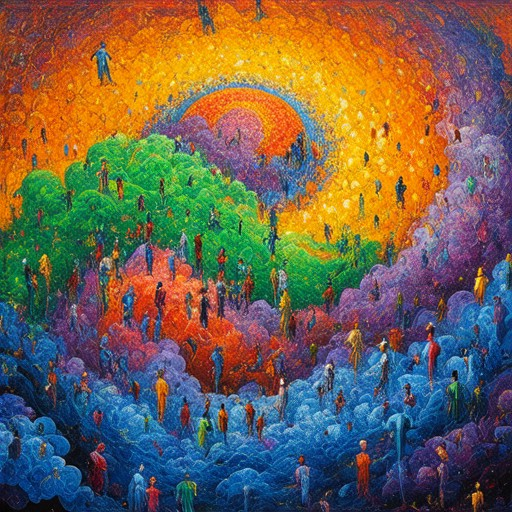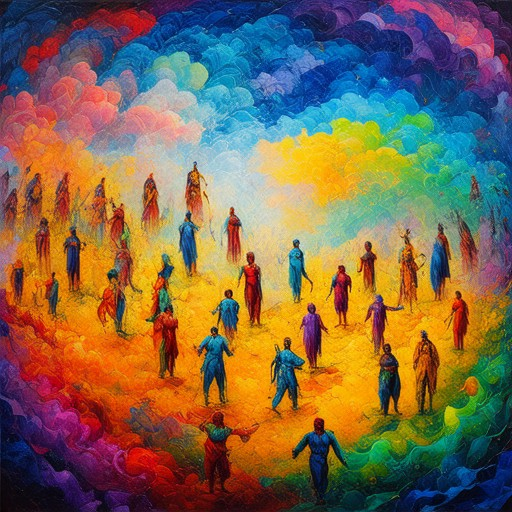Exploring global cultures through travel offers a unique opportunity to connect with diverse worlds, each rich with history, traditions, and perspectives. In today’s interconnected globe, travel has become a powerful tool for bridging cultural divides, fostering mutual understanding, and celebrating the richness of human experience. As globalization continues to shape our world, the role of travel in exploring and embracing these global cultures becomes increasingly vital. From immersing yourself in the vibrant customs of Asia to discovering the historical landmarks of Europe, every journey is a chance to learn, grow, and appreciate the multifaceted nature of our global society. This exploration delves into the intricate relationship between travel and culture, examining how these experiences contribute to personal development and the collective understanding of our interconnected world.
Key Takeaways
– Cultural Awareness Enhances Travel Experiences: Understanding local customs fosters respectful and harmonious interactions, enriching your journey.
– Appreciate Local Traditions for Deeper Connections: Knowledge of local customs and traditions leads to meaningful cultural exchanges.
– Sustainable Tourism Protects Heritage: Respecting environmental and cultural heritage ensures destinations remain preserved for future generations.
– Educational Journeys Foster Authentic Engagement: Exploring history and beliefs provides travelers with a richer, more authentic connection to local communities.
– Cultural Exchange Strengthens Global Understanding: Immersive experiences break down barriers, promoting empathy and cross-cultural respect.
– Travel as a Tool for Cultural Growth: Broadening perspectives through local traditions and customs encourages open-mindedness and inclusivity.
– Diverse Tourism Drives Economic Growth: Celebrating cultural heritage attracts tourists, boosting local economies and creating job opportunities.
– Preserving Culture for Future Generations: Sustainable tourism practices protect ecosystems while honoring cultural legacy.
– Bridging Gaps Through Travel: Interactive experiences reduce misunderstandings and build lasting connections between cultures.

How Does Globalization Affect Travel?
Globalization has significantly transformed the travel industry, offering both opportunities and challenges. Here’s a breakdown of its impact:
Economic Effects
- Lower Costs: Globalization has made travel more affordable through cheaper flights, budget accommodations, and package deals.
- Increased Disposable Income: Rising economies in developing countries and improved wages have enabled more people to travel.
- Job Creation: The tourism sector has seen significant job growth in various regions, boosting local economies.
Technological Impact
- Improved Transportation: Advances in technology have led to faster, more efficient travel options like low-cost airlines and high-speed trains.
- Communication Tools: Access to real-time information and online booking systems has simplified trip planning and decision-making.
Cultural Exchange
- Cultural Exposure: Globalization has allowed people to experience diverse cultures, shaping travel preferences and inspiring wanderlust.
- Influence on Tourism: Cultural attractions draw travelers, fostering cross-border understanding and appreciation.
Impact on Destinations
- Growth in Developing Countries: Destinations in Asia, Africa, and South America have seen a rise in tourism, boosting their economies.
- Challenges in Developing Countries: Some nations struggle with infrastructure, preserving cultural heritage, and managing tourist influxes.
Sustainability Concerns
- Environmental Impact: Increased tourism leads to habitat destruction, pollution, and resource depletion.
- Cultural Homogenization: Globalization may dilute unique traditions, affecting local cultures and authenticity.
Competitive Advantage
- Leaving a Lasting Impression: Destinations must adapt to meet traveler expectations, enhancing services and experiences.
- Diversifying Offerings: Offering unique experiences and cultural immersion can set a destination apart from competitors.
For instance, platforms like Bending Borders showcase global travel stories, highlighting diverse perspectives and destinations. Exploring these aspects helps travelers understand the multifaceted impact of globalization on travel, encouraging responsible and informed tourism.
Why is Travel Important in Culture?
Travel plays a crucial role in shaping and preserving culture. It bridges gaps between different societies, fostering mutual respect and understanding. Here’s a breakdown of its significance:
- Cultural Appreciation: Travel exposes individuals to diverse customs, traditions, and lifestyles, promoting a deeper appreciation for one’s own culture while gaining insight into others.
- Perspective Broadening: By experiencing different ways of life, travelers often develop a more open-minded view of the world, challenging stereotypes and expanding their horizons.
- Personal Growth: Engaging in new experiences and overcoming challenges during travel contributes to individual development, fostering resilience, adaptability, and self-confidence.
- Economic Impact: Tourism supports local businesses, preserves cultural heritage, and creates job opportunities, contributing to the vibrancy and sustainability of communities.
- Cultural Exchange: Travel facilitates the sharing of ideas, art, and customs, leading to collaborative projects that celebrate cultural diversity and enrich both participants.
- Education and Inspiration: Firsthand experiences from travel offer unparalleled educational opportunities, inspiring future studies, career paths, and a deeper understanding of global issues like sustainability and climate change.
- Environmental Stewardship: Witnessing environmental and social challenges firsthand can motivate individuals to take action, supporting initiatives like sustainable tourism and community development.

Global Cultures
Global cultures refer to the diverse traditions, beliefs, customs, and behaviors that define societies around the world. These cultures are shaped by a society’s history, geography, economy, and social structure, and they reflect the unique ways people live, interact, and understand the world.
Characteristics of Global Cultures
- Diversity: Cultures vary widely across countries, regions, and communities, each offering distinct values, norms, and practices.
- Interconnectedness: Globalization has led to increased exchange of ideas, technologies, and practices, blending cultures from different parts of the world.
- Evolution: Cultures are dynamic and constantly evolving, influenced by migration, technological advancements, and changing societal needs.
- Influence: Cultures shape individual identities and contribute to the development of local economies, politics, and arts.
Examples of Global Cultures
- Muslim cultures, characterized by practices like prayer and fasting during Ramadan.
- Chinese culture, marked by traditions like Lunar New Year celebrations and Confucian values.
- Indian culture, known for its vibrant festivals like Diwali and intricate dance forms like Bharatanatyam.
- African cultures, celebrated through music, dance, and oral storytelling traditions.
The Role of Globalization
Globalization has accelerated the exchange of cultures, leading to hybrid forms like:
- Fusion cuisine, combining dishes from different culinary traditions (e.g., sushi burritos).
- Cultural blends in fashion, such as traditional African prints reimagined in modern Western designs.
- Global holidays, like Halloween, which have adapted to local cultures worldwide.
Challenges and Preserving Diversity
While globalization fosters cultural exchange, it also poses risks like cultural homogenization. Preserving diverse cultures requires efforts to celebrate their uniqueness and promote cross-cultural understanding and respect.
Engaging with Global Cultures
Individuals can explore global cultures through:
- Travel and experiencing cultural festivals, museums, and landmarks.
- Media consumption, such as watching movies, TV shows, and documentaries from different countries.
- Educational programs focused on cultural studies and diversity.
By understanding and appreciating global cultures, we gain valuable insights into human society and our shared humanity.

Why is Cultural Awareness Important in Travel?
Cultural awareness plays a vital role in travel, fostering meaningful connections and minimizing misunderstandings. Here’s how it enhances travel experiences:
- Respect and Avoid Offense : Understanding local customs, gestures, and attire prevents accidental insults, ensuring harmonious interactions.
- Appreciation of Local Customs : Knowledge of local traditions enriches the travel experience, leading to deeper connections with the culture and its people.
- Sustainable Tourism : Respecting environmental and cultural heritage supports eco-friendly practices, preserving destinations for future visitors.
- Educational Opportunities : Self-guided education on history, beliefs, and social norms allows travelers to engage more authentically with local communities.
- Cultural Exchange : Open-mindedness from travelers fosters cross-cultural understanding, benefiting society beyond individual trips.
- Enjoyable and Conflict-Free Experiences : Awareness reduces the likelihood of discomfort or conflict, contributing to happier and more fulfilling travel memories.
Thus, cultural awareness in travel is essential for respectful, enriching, and sustainable experiences that benefit both travelers and host communities.
Why Is Cultural Diversity Important In Tourism?
Cultural diversity plays a vital role in shaping the tourism industry, offering unique experiences, fostering global connections, and supporting local economies. Here’s a breakdown of its significance:
- Enriches Visitor Experiences : Cultural diversity provides tourists with authentic and memorable experiences, allowing them to connect with the destination’s soul through local traditions, festivals, and customs.
- Economic Impact : Cultural attractions attract more tourists, boosting local revenues. Preserving cultural heritage ensures these attractions remain relevant and vibrant for future generations.
- Fosters Social Understanding : Cultural diversity encourages mutual respect and empathy among different groups, enhancing interactions between locals and visitors and creating an inclusive environment.
- Promotes Sustainability : By celebrating cultural heritage, tourism can inspire eco-conscious behavior, respecting local customs and environments, thus preserving ecosystems and ensuring responsible travel practices.
- Drives Innovation : Destinations embracing their unique cultures often develop creative tourism activities, such as traditional performances or themed events, setting them apart from competitors.
- Benefits Host Communities : Local businesses thrive by catering to diverse needs, creating jobs and improving livelihoods. It also strengthens community bonds as residents celebrate their shared heritage.
- Contributes to Peacebuilding : Exposure to diverse cultures can cultivate appreciation for inclusivity, fostering global advocates for diversity and positively impacting societies beyond tourism.
- Competitive Advantage : Leveraging cultural uniqueness attracts specific tourists, giving destinations a market edge and increasing their appeal in the global tourism market.
In essence, cultural diversity in tourism is essential for enriching experiences, driving growth, and fostering a more inclusive and harmonious world.

Does Travel Increase Cultural Understanding?
Travel has long been recognized as a powerful tool for fostering cultural understanding. By immersing oneself in different cultures, individuals gain insights into various lifestyles, traditions, and perspectives that can challenge stereotypes and promote empathy.
- Breaking Down Barriers: Travel provides an opportunity to interact with people from diverse backgrounds, leading to a deeper appreciation of cultural differences. This interaction often breaks down barriers and fosters mutual respect.
- Experiencing Local Traditions: Engaging in local festivals, customs, and traditions allows visitors to connect with the essence of a culture. This firsthand experience helps bridge the gap between tourists and locals.
- Perspective-Taking: Traveling broadens one’s worldview, encouraging individuals to see things from different cultural lenses. This shift in perspective can lead to a more open-minded and inclusive mindset.
- Educational Opportunities: Tourists often visit museums, historical sites, and cultural landmarks that offer educational experiences. These encounters provide a foundation for understanding a destination’s heritage and values.
Cultural travel programs, such as those offered by Bending Borders , emphasize immersive experiences that highlight the unique characteristics of different regions. These programs aim to create a platform for cross-cultural dialogue and understanding, encouraging travelers to explore beyond surface-level observations.
By exposing individuals to diverse cultures, travel not only enriches their personal growth but also contributes to a more interconnected global community. The shared experiences and mutual respect cultivated through travel serve as a foundation for peaceful coexistence and collaboration in an increasingly interconnected world.
Conclusion
Ultimately, travel is a transformative experience that enhances cultural understanding. It challenges assumptions, promotes empathy, and bridges gaps between people. Whether for leisure or educational purposes, travel continues to play a vital role in fostering meaningful connections across cultures.




0 Comments